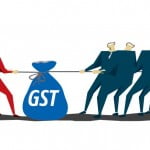 The broad contours of the new goods and services tax (GST) regime are falling in place. The draftGST Bill shows the key differences and similarities between the current indirect tax regime and the proposed one. At present, ‘goods’ primarily suffer two levies (excise duty and state value added tax or VAT), whereas ‘services’ attract only one levy – service tax. In the new regime, all supply will attract GST (Central GST plus state GST or integrated GST). Currently, indirect taxes are payable on events such as ‘manufacture’, ‘sale’, ‘provision of services’, etc. In the GST regime, these events will lose their relevance, as GST will be applicable on ‘supply’ made for a consideration. The state VAT is payable only on sale made against a consideration. However, in the GST regime, even if supply is made without consideration, GST will be applicable in specified scenarios, such as, self-supply of goods or services. Even, ‘barter’ of goods, which were hitherto un-taxed in state VAT regime, is expected to attract GST. As regards stock transfer from one state to another state, currently, state VAT is not payable (subject to conditions). However, according to the draft, inter-state branch transfers will attract IGST. At present, a service provider in a domestic transaction does not identify place of provision of the service (as service tax is payable to the Central government). However, in GST regime, it would be crucial to determine place of supply of services even in case of domestic transactions as state will also be entitled to their GST share.
The broad contours of the new goods and services tax (GST) regime are falling in place. The draftGST Bill shows the key differences and similarities between the current indirect tax regime and the proposed one. At present, ‘goods’ primarily suffer two levies (excise duty and state value added tax or VAT), whereas ‘services’ attract only one levy – service tax. In the new regime, all supply will attract GST (Central GST plus state GST or integrated GST). Currently, indirect taxes are payable on events such as ‘manufacture’, ‘sale’, ‘provision of services’, etc. In the GST regime, these events will lose their relevance, as GST will be applicable on ‘supply’ made for a consideration. The state VAT is payable only on sale made against a consideration. However, in the GST regime, even if supply is made without consideration, GST will be applicable in specified scenarios, such as, self-supply of goods or services. Even, ‘barter’ of goods, which were hitherto un-taxed in state VAT regime, is expected to attract GST. As regards stock transfer from one state to another state, currently, state VAT is not payable (subject to conditions). However, according to the draft, inter-state branch transfers will attract IGST. At present, a service provider in a domestic transaction does not identify place of provision of the service (as service tax is payable to the Central government). However, in GST regime, it would be crucial to determine place of supply of services even in case of domestic transactions as state will also be entitled to their GST share.
Currently, Cenvat credit regime disallows Cenvat credit on various services such as motor vehicle-related services, catering services, employee insurance, etc. Similarly, state VAT laws restrict input tax credit in respect of motor vehicles, construction, etc. This denial of credits leads to unnecessary cost burden. It was expected that in the GST regime, seamless credit will be allowed to business without any denial, except, say, in case of goods or services that are availed of for personal use. However, according to the draft, the aforesaid credit would continue to be not available. Further, most of the current provisions such as reverse charge, tax deduction, pre-deposit, prosecution, arrest, self-assessment, etc., will continue. So, prima-facie it appears, while everything will get taxed in the near future, most of the current inefficiencies of the system may continue.
[“source -business-standard”]




